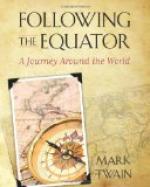“The language of our citizens, in this as in other parts of Australasia, is mostly healthy Anglo-Saxon, free from Americanisms, vulgarisms, and the conflicting dialects of our Fatherland, and is pure enough to suit a Trench or a Latham. Our youth, aided by climatic influence, are in point of physique and comeliness unsurpassed in the Sunny South. Our young men are well ordered; and our maidens, ‘not stepping over the bounds of modesty,’ are as fair as Psyches, dispensing smiles as charming as November flowers.”
The closing clause has the seeming of a rather frosty compliment, but that is apparent only, not real. November is summer-time there.
His compliment to the local purity of the language is warranted. It is quite free from impurities; this is acknowledged far and wide. As in the German Empire all cultivated people claim to speak Hanovarian German, so in Australasia all cultivated people claim to speak Ballarat English. Even in England this cult has made considerable progress, and now that it is favored by the two great Universities, the time is not far away when Ballarat English will come into general use among the educated classes of Great Britain at large. Its great merit is, that it is shorter than ordinary English—that is, it is more compressed. At first you have some difficulty in understanding it when it is spoken as rapidly as the orator whom I have quoted speaks it. An illustration will show what I mean. When he called and I handed him a chair, he bowed and said:
“Q.”
Presently, when we were lighting our cigars, he held a match to mine and I said:
“Thank you,” and he said:
“Km.”
Then I saw. ‘Q’ is the end of the phrase “I thank you” ‘Km’ is the end of the phrase “You are welcome.” Mr. Little puts no emphasis upon either of them, but delivers them so reduced that they hardly have a sound. All Ballarat English is like that, and the effect is very soft and pleasant; it takes all the hardness and harshness out of our tongue and gives to it a delicate whispery and vanishing cadence which charms the ear like the faint rustling of the forest leaves.
CHAPTER XXV.
“Classic.” A book which people praise
and don’t read.
—Pudd’nhead
Wilson’s New Calendar.
On the rail again—bound for Bendigo. From diary:
October 23. Got up at 6, left at 7.30; soon reached Castlemaine, one of the rich gold-fields of the early days; waited several hours for a train; left at 3.40 and reached Bendigo in an hour. For comrade, a Catholic priest who was better than I was, but didn’t seem to know it—a man full of graces of the heart, the mind, and the spirit; a lovable man. He will rise. He will be a bishop some day. Later an Archbishop. Later a Cardinal. Finally an Archangel, I hope. And then he will recall me when I say, “Do you remember that trip we made from Ballarat to Bendigo, when you were nothing but Father C., and I was nothing to what I am now?” It has actually taken nine hours to come from Ballarat to Bendigo. We could have saved seven by walking. However, there was no hurry.




